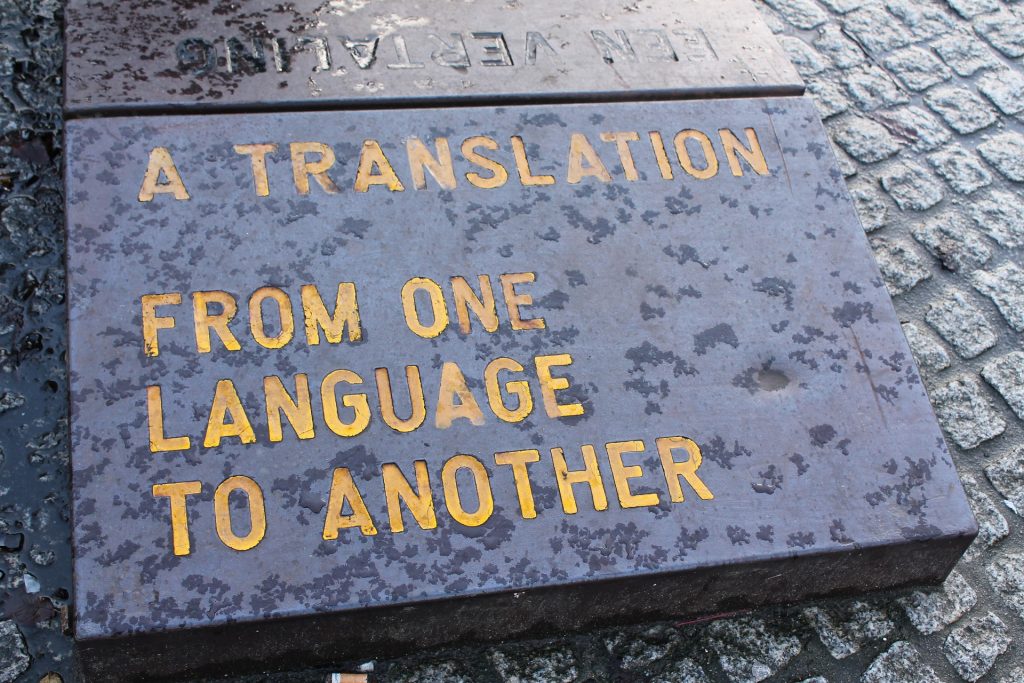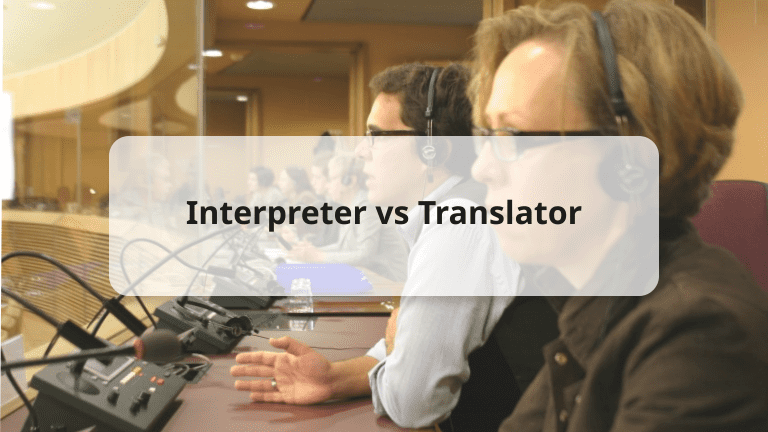Interpreter vs Translator, aren’t they the same? English terms can sometimes be hard to understand. People sometimes get confused about who an interpreter and a translator are or what they do. Both must have advanced knowledge of both languages indeed, but some don’t even know the actual difference between the two professions, and they use it interchangeably while some contact interpreters with the intention of seeking a translator, and vice-versa.
Although both professions do have some similarities, they are actually different in terms of the service they offer, and you must know who to contact at each point in time. In this article, we will be discussing interpreters and translators, what the profession entails and the kind of work they do, the similarities and differences, qualifications to become one, work accuracy, career prospect, lucrativeness, and finally how to know when you need an interpreter, or a translator.
Translator vs Interpreter: the Difference
The key difference between interpreter vs translator: A translator and an interpreter are quite similar and they are both called linguists because they work by converting sentences from one language to another, while still carrying the same meaning and intent. They usually translate into their native language. For instance, if you are a native English speaker, you might interpret or translate Japanese or Spanish into English. They are mainly required by people who do not understand the particular language the interpreter or translator is a native of, either for work purposes, business, academics, etc.

Interpreter vs Translator: What do they really do?
A translator service is quite different from what an interpreter does. This profession is someone who translates any form of written language to a client’s desired language, which is mostly in the translator’s native language. While an interpreter only deals with spoken words, they orally interpret into the client’s preferred language (target language). Unlike the translator, they can be required to interpret from or to their native language. Thus, these two professions require slightly different skill sets, to expertly deliver their best services.
Materials and Format
The kinds of materials and formats in which both professions work are quite different. Translators work on any information in written format. This may include typeset documents, articles, books, information on websites, print, video subtitles, multimedia, software, and so on. Translators are not generally required to translate in real-time, so they usually give a turn-around time to work on their translation, depending on how technical the document is. And this may range from a few days to a week, or even more. However, an interpreter on the other hand listens to speeches, and interprets the sentence in real-time, on the spot. Working as an interpreter requires more expertise because they must be able to listen attentively, and be fluent in both the source and target language since they are required to translate in both directions instantaneously without the aid of reference materials such as a dictionary which a translator may use.

Work Accuracy
Translator
Translators differs from an interpreter in terms of work accuracy as well. Translators rely on Computer Aided Translation (CAT) tools, dictionaries, and translation software to offer the best translation and meaning to the information they are translating. To ensure proper translation, they normally convert the document to be translated into RTF format, where a translation memory (TM) is used to automatically translate the text. To assure quality, translators may employ glossaries as the translation process progresses because they may encounter some words with multiple meanings. They may also delegate proofreading to other translators before converting the final written document back into its original format to ensure the finest possible translation match.
Interpreter
However, interpreters must be capable of presenting the message either simultaneously with the original speech (Simultaneous Interpreting) or shortly afterward (Consecutive Interpreting). If they are not physically present, they normally use headphones and a microphone in a booth, as well as a notepad and a pen to take notes – but most crucially, they rely on their memory and proficient language interpretation and sound conversational English skills to perform accurately.

Qualifications
What do you need to qualify as a professional interpreter or a translator? Well, the requirement for the two professions is almost the same with only a slight difference. To become an interpreter, you must have the ability to demonstrate bilingualism and literacy through any language proficiency test, have a certificate for professional interpreter training with at least 40 hours of training, and hold a high school diploma or equivalent. You must also have a solid general education and a broad vocabulary in both languages, as well as knowledge of the overall subject and technical areas of the content to be interpreted. You also need excellent note-taking techniques for consecutive interpreting and finally, at least 2-3 years of experience for simultaneous interpreting.
Other Additional qualification
While the requirement is almost the same for a translator, you need excellent writing skills in your own mother tongue, fluent or near-native understanding of at least one foreign language (source language), solid knowledge of the culture of the source language country, usually gained by living and working there for a prolonged period of time. An academic degree in the source language. Although it is not mandatory to also possess a master’s degree in Translation or another similar qualification such as the Diploma in Translation (DipTrans), this certificate would give you credibility and an edge in this highly competitive market.
Direction
As previously said, interpreters and translators work in slightly different directions. Interpreters must translate in both directions, i.e., source and target languages, almost instantly and without assistance. As a result, they must be both professional and fluent. Translators, on the other hand, often operate in only one direction, i.e., into their native language, so they only need to be fluent or have a near-native understanding of the other language.
Interpreter vs Translator: the Job
There are a lot of jobs out there for anyone interested in becoming a translator or an interpreter. The career prospects in this field are awesome, as you can literally work in almost all sectors, where effective communication is important. An interpreter or translator may be required to translate a variety of content or speeches ranging from commercial, legal, finance, political, or even medical. They are mostly hired by translation agencies or sometimes direct clients, and they generally have a broad portfolio of clients that they work with on a regular basis. Working as an interpreter or translator, you can also get jobs as a freelancer, or in public institutions

Work Environment
Translator
Another important difference between a translator and an interpreter is their work environment. Translators usually work in the office, although some may work from home since they only deal with written material and they have more time to carefully do their translation, so they tend not to engage in frequent traveling to get their job done. They mostly work as in-house staff in translation agency offices, multinational/multilingual companies, governmental organizations, NGOs, or their client/employer’s office space, and they generally have a fixed working week. They are answerable to their line managers/clients from whom they get tasks and deadlines.
Freelancing as a Translator
You may also be a freelance translator, wherein you register yourself and be working for different translation agencies or direct clients. Although as a freelance translator, getting tasks frequently is not guaranteed and you may never know where your next job is coming from. They must do their own marketing and take full legal responsibility for the work they produce.
Interpreter
Whereas an interpreter engages in traveling a lot of times for their job. As an interpreter, you mostly be beside the person whom you are interpreting since they deal with real-time spoken words. So, they are required to interpret almost immediately to maintain the communication line during that event. For example, sports teams hire interpreters to improve communication between international athletes and their teammates, coaches, and members of the media. Some interpreters work as liaisons, interpreting for hospitals, and police, during legal proceedings, live TV coverage, events, meetings conferences, and so on. Interpreters don’t work remotely, so you must be always mobile and be available at odd hours sometimes.

Working in Offices, too
However, some interpreters do work in office spaces. They may provide interpretation services at consulates, e.g., at the United Nations convention. Communications aid such as headphones and a microphone, telephone, video, or internet-based technologies, allows interpreters to listen to and interpret conversations in real time even when they are not physically near the speakers.
How much do translators and interpreters make?
Interpreters and translators earn a similar amount of money, however, how they are compensated are different. Since translators work with written materials, they may be paid on a per-word, sentence, or per-page basis. Some may be paid by the hour. On average, they charge a translation rate of $0.12 per word, and hourly rates may typically range between $15 to $25.
In contrast, interpreters are typically compensated by the hour, half a day, or for a full day (depending on the case). Their average hourly pay is about $23 in the US and may make up to $111 for a half day of work, and $202 for a full day of work. In addition, interpreters who must travel for work can expect to receive reimbursement for their expenses.
Translator vs Interpreter
| TRANSLATOR | INTERPRETER |
|---|---|
| Work with written languages | Work with spoken language |
| Translation requires time for their translation | Interpreters work in a real-time situation |
| Translators translate only to a target language usually their native language | Interpreters are fluent in both source and target language |
| Translators use reference material e.g. dictionary to aid their work | Interpreter only relies on their knowledge and experience |
| Translators mostly work remotely or in offices with n frequent traveling | Interpreters can’t work remotely. They travel a lot as they mostly have to be beside who they are interpreting to |
| Translators work on written documents, books, texts, and generally any information on prints | Interpreters only listen to and interpret speeches in real time, as they are needed to keep the communication line at that particular point. |
| Translators usually work in translation company offices or with clients | Interpreters may work in hospitals, courts, sports rooms, conferences, business meetings, etc. |
Wish to Become a Translator or an Interpreter?
Being either a translator vs interpreter requires professionalism in more than one language. It is a job that can earn you a fortune. Being an interpreter requires more expertise since you wouldn’t have any aid and time to deliver on your tasks, unlike being a translator, that can rely on reference materials such as Japanese translator apps, to ensure quality translations. But if you would love working from home, being a translator is your best choice. The first step to becoming an interpreter or a translator is by learning different languages. AmazingTalker is an affordable online platform with thousands of friendly, dedicated, and qualified tutors. With AmazingTalker, you can easily and efficiently learn all the official languages used by successful translators and interpreters globally.
















